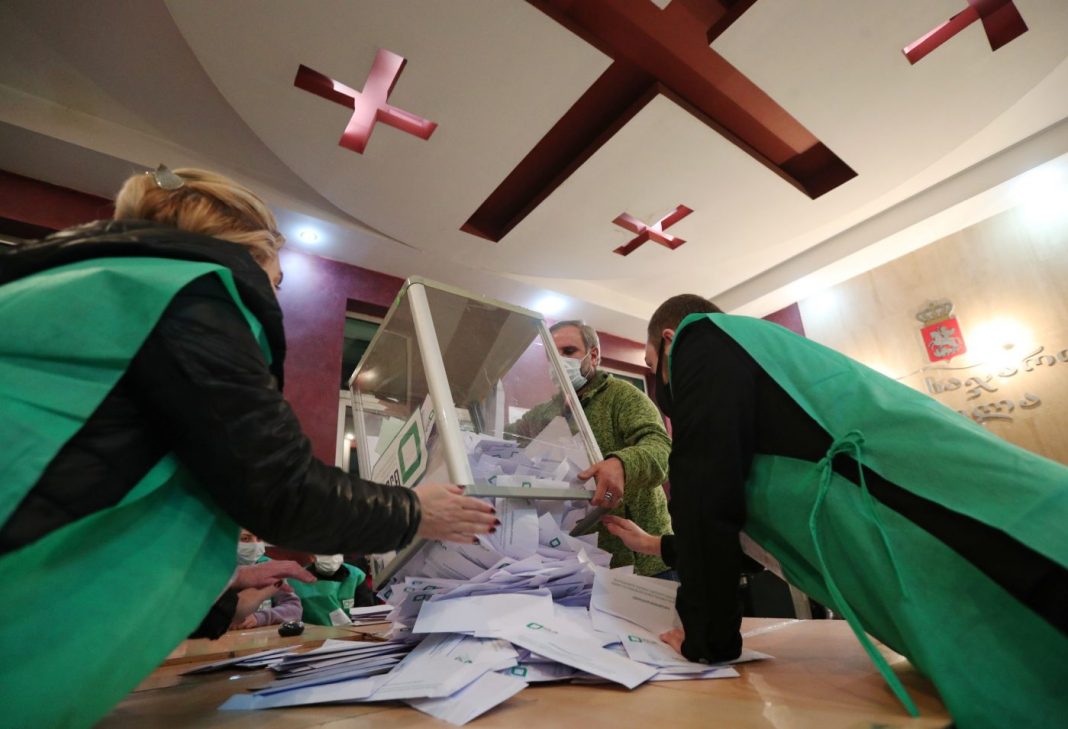By Ketevan Chachava, for CEPA
Georgia approaches critical parliamentary elections that will decide its democratic evolution.
Georgia’s previous elections have been plagued by allegations of fraud, manipulation, and widespread public distrust, undermining confidence in the process and triggering protests and political instability.
The October 26 vote will therefore see significant reforms, including full proportional representation and the adoption of electronic voting. While these changes aim to restore trust and modernize the system, they present challenges that will shape Georgia both domestically and its relationships abroad.
The elections are unfolding against a polarized political landscape in which divisions have deepened following controversial legislation that sparked huge protests in April and May. The rushed abolition of gender quotas, the passage of the Russian-style “foreign agent” law, the introduction of an anti-LGBT+ legislative package and 18 amendments to a series of laws all triggered anger and defiance.
The governing Georgian Dream Party’s rhetoric toward the West — its founder, Bidzina Ivanishvili, calls the West the “party of war” and says it forced Georgia and Russia into confrontation — has alarmed pro-European groups, international partners and observers, highlighting a broader struggle between pro-European and pro-Russian forces. All sides agree the upcoming elections are a critical moment for Georgia’s future.
It might therefore seem a strange time to introduce a new electoral system. In fact, the changes have been broadly welcomed. The elections will be the first conducted under a fully proportional system — a significant milestone in Georgia’s democratic journey, achieved after extensive campaigning by opposition parties and domestic observer organizations.
The new system is designed to better reflect the diversity of political opinions and ensure a more equitable distribution of parliamentary seats. By abolishing the majoritarian component, it aims to reduce the dominance of larger parties and create a more inclusive political landscape.
But the reforms have also led to concerns about representation. The 5% electoral threshold, aimed at minimizing fragmentation, will exclude some smaller parties and may stifle political diversity — while nine parties won seats in the 2020 vote, another 42 failed to take any, though many achieved tiny vote shares. Independent candidates are also not allowed under the new framework, sparking claims that political competition is being restricted.
Making the electorate aware of these changes is critical, particularly as polarization remains so high.
Of the 27 registered parties this time, 19 submitted party lists before the deadline. But despite attempts to find unity by creating a pro-European or centrist coalition, the opposition remains fragmented.
One notable development was Georgian Charter, inspired by President Salome Zurabishvili, an opponent of the government. This group proposes a technocractic administration to begin EU accession talks and hold new elections in 2025.
To rebuild public trust after a history of allegations of fraud and vote manipulation, Georgia is also introducing electronic voting technology on an unprecedented scale.
All parties and the Central Election Commission (CEC) support electronic voting to enhance transparency and improve the credibility of the process. By reducing human error and streamlining vote counting, the aim is to deliver more accurate and timely results.
However, while electronic voting will be used by nearly 90% of the electorate, the rapid rollout of the technology presents a number of risks.
Technical malfunctions, insufficient training for election officials and voter unfamiliarity could undermine the process. And reports of technical issues during trial runs have raised concerns about the system’s reliability.
The shift has also created fertile ground for disinformation campaigns. Disinformation about the security and transparency of electronic systems are circulating on social media, amplifying public skepticism. Some voters have expressed concern that their votes could be tracked or manipulated, despite assurances from the authorities.
To counter this, it is vital to have clear, accessible information on how the systems work. A robust public education campaign is essential to building trust in the electoral process and ensuring voter confidence.
Election observers, both domestic and international, also play a crucial role in ensuring transparency and accountability during elections, and Georgia has a strong tradition of election monitoring.
However, the inclusion of electronic systems complicates the observers’ role. Many are unfamiliar with the technology and the law has yet to fully integrate guidelines for observing electronic voting. A comprehensive legal framework that addresses both procedural and technical aspects of the process is vital for maintaining transparency and trust.
Georgian Dream’s extraordinary pledge to eliminate opposition parties and hold “Nuremberg” trials for critics from civil society and the media have created a hostile environment for observer organizations.
Ensuring domestic observers are adequately trained and have the necessary information is critical for maintaining trust, and the rise of new, less experienced observer groups presents potential risks. While inclusivity in observation missions is important, a lack of professionalism and insufficient preparation could undermine their credibility and, by extension, the integrity of the result.
The international community will be watching closely to see how the elections unfold, particularly in the context of Georgian aspirations for closer ties with the EU — some 86% of citizens support membership. The outcome could have significant implications for foreign policy, as well as Georgia’s domestic stability.
What happens after the elections will depend largely on how well the new electoral system functions and how effectively the challenges associated with electronic voting are managed.
The transition to a fully proportional system and the implementation of electronic voting are steps toward a more modern and transparent electoral process. Ensuring voters are well-informed, election officials are properly trained and disinformation is effectively countered will be crucial for a smooth and credible outcome.
Georgia’s ability to navigate the election’s challenges will set the tone for its future as a democratic nation committed to European values.
By Ketevan Chachava, for CEPA
Ketevan (Kate) Chachava is a Non-resident Fellow with the Democratic Resilience Program at CEPA. She is a Georgian civic and democracy activist and is the executive director and founder of the Tbilisi-based Center for Development and Democracy (CDD), founder and Chairperson of Sector 3 – Hub for Development, and founder and board member of a socially-oriented NGO “YouCreator.” She is also a Steering Committee member of World Movement for Democracy. She holds a post-graduate diploma in Strategic Communications from King’s College London.
Europe’s Edge is CEPA’s online journal covering critical topics on the foreign policy docket across Europe and North America. All opinions are those of the author and do not necessarily represent the position or views of the institutions they represent or the Center for European Policy Analysis.





